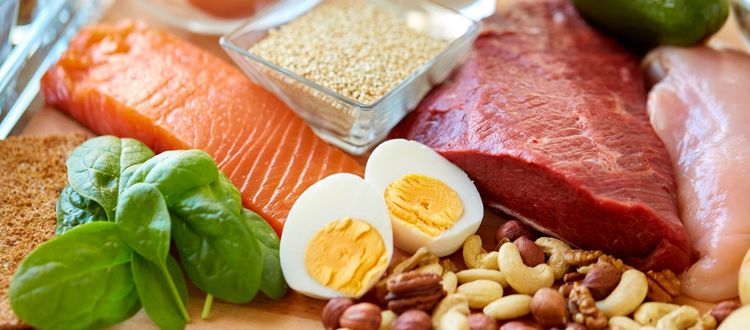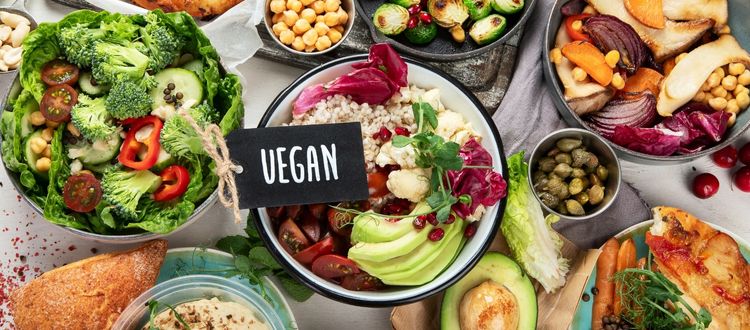Explore a variety of foods containing protein and their health benefits. From plant-based to animal-based sources, learn how these foods support muscle growth, weight management, and overall wellness.
Protein is one of the fundamental building blocks of body cells. Almost all of your tissues, such as hair, skin, muscles, and bones, contain protein. So, do you know the roles of protein in the body? Protein plays a crucial role in almost all bodily functions, from blood clotting to maintaining electrolyte-fluid balance, from cell growth and development to the repair and renewal of tissues. Foods containing protein have a significant role during all vital functions, such as chemical reactions in the body and energy metabolism.
What Foods Contain Protein?
How about we start with understanding what protein is? Protein is a large molecule; it consists of small units called amino acids, which are connected in long chains. A protein molecule is formed when 20 different amino acids come together. Even though the same amino acids are used, each protein is different from one another. The diversity of proteins is provided by the sequence of amino acids. This sequence allows each protein to acquire its unique 3-dimensional structure and determines its function. Foods containing protein that should be included in a healthy diet are listed as follows:
- Eggs
- Chicken
- Cheese
- Yogurt
- Milk
- Red Meat
- Fish
Your body can synthesize some of the amino acids needed to form a protein molecule on its own. However, you must obtain 9 amino acids called essential amino acids through foods (histidine, isoleucine, leucine, lysine, methionine, phenylalanine, threonine, tryptophan, and valine). The type and amount of protein, described as essential for a balanced diet, is especially important for children during growth and development, pregnant women, nursing mothers, and athletes.So, what happens if you consume insufficient protein? Conditions such as anorexia nervosa, certain genetic factors, protein absorption disorders (Irritable Bowel Syndrome, gastric bypass, etc.), and advanced stages of cancer are among the reasons for protein deficiency. This situation can lead to muscle weakness, edema, hair breakage and weakness, skin lesions, hormonal imbalances, and growth and developmental disorders in children.

Foods Containing Protein
It is very important to consume enough protein daily to maintain your overall health. So, how should you consume proteins? Proteins from food sources are divided into animal and plant-based. Animal-based proteins contain all amino acids, including those essential amino acids that your cells cannot synthesize. Your body digests and utilizes animal protein sources more easily. Therefore, they are considered high-quality protein sources. Plant-based proteins, in comparison to animal sources, have a deficient amino acid profile. Adding protein containing foods to your diet can help meet your body’s protein needs.
High Protein Foods
Eggs
Eggs, one of the most accessible high-quality protein sources, are also rich in antioxidants, vitamins, and minerals. An average medium-sized egg, about 50 grams, contains 6.3 grams of protein and is rich in vitamins A, B, and the mineral selenium.
Chicken
A high-quality protein source, chicken is also rich in B vitamins, zinc, and selenium. Due to its ease of cooking and affordability, it is one of the most consumed foods. 100 grams of chicken breast contains about 31 grams of protein.
Cheese
Often one of the first foods to come to mind when thinking of animal-based protein, cheese is rich in vitamins B2 and B12, as well as calcium phosphorus, and selenium. 100 grams of cheese contains about 12.4 grams of protein
Yogurt
A favorite in Turkish cuisine for its unique flavor, yogurt not only has a high protein content but is also rich in vitamin A, B12, and minerals such as calcium, selenium, and zinc. One serving of yogurt, about 200 grams, contains approximately 20 grams of protein.
Milk
Among the top sources of high-quality protein, milk is rich in B vitamins and minerals like calcium and phosphorus. It plays a significant role in the development of bones and teeth, especially in children. One cup of milk, about 200 milliliters, contains an average of 7 grams of protein.
Read Meat
A nutrient-rich source of protein, red meat contains high levels of iron. It is also a good source of zinc, selenium, and vitamins B12 and B6. 100 grams of red meat contains about 30 grams of protein.
Fish
An exceptional source of protein, fish is also rich in antioxidants and Omega-3 fatty acids, which play a role in all bodily functions. Fish is a good source of iodine, selenium, and vitamin B12, and supports the maintenance of heart health and overall well-being. 100 grams of fish contains about 25 grams of protein.
What Are Protein-Rich Foods for Vegans?

Foods Containing Protein
Foods Containing Protein
If you are following a vegetarian or vegan diet, you do not consume animal-based proteins. Therefore, it is crucial to identify and incorporate plant-based protein sources into your daily meals. While vegan protein sources may have a different amino acid profile compared to animal-based proteins, they still provide essential nutrients such as vitamins, minerals, fiber, and antioxidants, which contribute to overall health and well-being.
By including a variety of protein-rich plant foods, you can ensure that you meet your daily protein requirements while also benefiting from their additional nutritional properties. Below are some of the most nutrient-dense plant-based protein sources to consider in a vegan diet.
1. Oil Seeds and Nuts
Nuts and seeds are not only excellent sources of plant-based protein, but they also provide healthy fats, vitamin E, magnesium, manganese, and fiber. Regular consumption of nuts supports heart health, brain function, and digestion. Some of the best protein-rich nuts and seeds include:
- Walnuts
- Hazelnuts
- Almonds
- Cashews
- Pistachios
A handful of mixed nuts (approximately 30 grams) contains around 6 grams of protein. Additionally, seeds such as chia seeds, flaxseeds, sunflower seeds, hemp seeds, and pumpkin seeds are fantastic alternatives that provide a rich protein boost while also delivering omega-3 fatty acids and fiber.
2. Legumes
Legumes are one of the best plant-based protein sources for vegetarians and vegans. They are packed with essential minerals such as magnesium, potassium, iron, and copper, as well as folate and other B vitamins, which are important for energy production and cell function.
Including dried beans, chickpeas, green lentils, red lentils, and black beans in your meals can significantly enhance your protein intake. They are also rich in fiber, which supports gut health and keeps you feeling full for longer.
✔ 100 grams of cooked legumes contain approximately 9 grams of protein.
To maximize nutrient absorption, consider pairing legumes with whole grains such as brown rice, quinoa, or whole wheat bread, which complement their amino acid profile.
3. Quinoa – A Complete Protein Source
Quinoa is one of the few plant-based foods that contain all 9 essential amino acids, making it a complete protein source. This sets it apart from most other plant proteins, which often lack one or more essential amino acids.
Besides being high in protein, quinoa is also packed with:
✔ Fiber – Supports digestion and gut health.
✔ Zinc – Strengthens the immune system.
✔ Iron – Important for oxygen transport in the blood.
✔ Copper – Plays a role in energy metabolism.
✔ Calcium and Potassium – Essential for bone health and muscle function.
✔ B Vitamins – Crucial for energy production and brain function.
✔ 100 grams of cooked quinoa provides approximately 4.4 grams of protein.
Quinoa is versatile and easy to prepare—it can be used in salads, soups, stir-fries, and even breakfast bowls.
4. Protein-Rich Fruits
While fruits are typically not considered high-protein foods, certain varieties contain more protein than others. If you are looking to optimize your protein intake, including these higher-protein fruits in your diet can be beneficial:
✔ Kiwi
✔ Avocado
✔ Guava
✔ Prickly pear
✔ Peach
✔ Blackberry
✔ Grape
✔ Banana
✔ Grapefruit
✔ Orange
✔ Cherry
These fruits not only contribute to protein intake but also provide vitamins, antioxidants, and hydration, making them great additions to a balanced vegan diet.
Final Thoughts
Ensuring sufficient protein intake on a vegan diet is entirely possible by incorporating a variety of nuts, seeds, legumes, grains, and fruits into your meals. Diversifying your plant-based protein sources will help you maintain a healthy and balanced diet, supporting muscle growth, energy levels, and overall well-being.
Would you like additional recipe ideas or meal planning suggestions based on these protein-rich foods? Let me know! 😊


